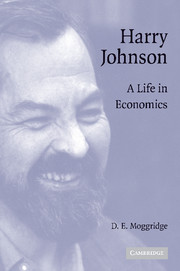Book contents
- Frontmatter
- Contents
- Photographs and Drawings
- HARRY JOHNSON
- Introduction
- 1 Toronto
- 2 Antigonish
- 3 England
- 4 North American Postgraduate
- 5 Cambridge Don
- 6 Cambridge Economist
- 7 Manchester
- 8 Chicago
- 9 Canada, Economic Nationalism, and Opulence, 1957–1966
- 10 Chicago: Money, Trade, and Development
- 11 LSE
- 12 Professional Life – Largely British
- 13 Money and Inflation
- 14 The International Monetary System
- 15 Harry's “Wicksell Period”
- 16 Stroke and After
- 17 Conclusion
- Sources
- Index
- Plate section
17 - Conclusion
Published online by Cambridge University Press: 04 December 2009
- Frontmatter
- Contents
- Photographs and Drawings
- HARRY JOHNSON
- Introduction
- 1 Toronto
- 2 Antigonish
- 3 England
- 4 North American Postgraduate
- 5 Cambridge Don
- 6 Cambridge Economist
- 7 Manchester
- 8 Chicago
- 9 Canada, Economic Nationalism, and Opulence, 1957–1966
- 10 Chicago: Money, Trade, and Development
- 11 LSE
- 12 Professional Life – Largely British
- 13 Money and Inflation
- 14 The International Monetary System
- 15 Harry's “Wicksell Period”
- 16 Stroke and After
- 17 Conclusion
- Sources
- Index
- Plate section
Summary
For the economics profession throughout the world the third quarter of this century was an Age of Johnson. … It was his impact on his own profession … that justifies calling the era his Age.
Tobin 1978, 443–4Tobin illustrated Harry's influence in terms of publications, citations, contributions to lectures, conferences and symposia, journal editing, and a “far flung, numerous and devoted band of students, friends and admirers” (444). He elaborated four reasons for his influence: his willingness to accommodate fellow scholars and students; his powers of exposition and synthesis informed by an almost limitless knowledge of the literature; his internationalism; and his status as a “character” in a profession with few colourful personalities. Graduate students at LSE used to refer to him as “big Harry.”
In Harry we had a hero whose style of life and work and talk were worthy of a genius of poetry or art. Physically he stood out of a crowd, a large man, incorrigibly overweight, loudly and informally dressed years before the unconventional became the fashion. Only his eyes betrayed the fire of his mind.
(446–7)Harry was, as C. P. Kindleberger remarked, “one who never did anything by halves: writing, editing, eating, drinking, smoking and, after giving up smoking, whittling” (1991, 151).
His passing was marked as few are in economics. There was a notice by A. R. Prest in The Economist, which in those days did not normally publish obituaries.
- Type
- Chapter
- Information
- Harry JohnsonA Life in Economics, pp. 413 - 432Publisher: Cambridge University PressPrint publication year: 2008

